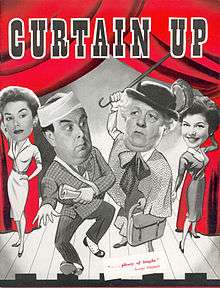Curtain Up
| Curtain Up | |
|---|---|
 Pressbook cover | |
| Directed by | Ralph Smart |
| Produced by | Robert Garrett |
| Written by |
Jack Davies Michael Pertwee |
| Based on | play by Philip King |
| Starring |
Robert Morley Margaret Rutherford Kay Kendall |
| Music by | Malcolm Arnold |
| Cinematography | Stanley Pavey |
| Edited by | Douglas Robertson |
Production company |
Constellation Films Rank Organisation |
Release dates |
|
Running time | 81 minutes |
| Country | United Kingdom |
| Language | English |
Curtain Up is a 1952 British film directed by Ralph Smart, written by Jack Davies and Michael Pertwee.[1] It is based on the play On Monday Next by Philip King.[2]
Plot
In an English provincial town, 'Drossmouth', a second-rate repertory company assemble at the Theatre Royal on Monday morning to rehearse the following week's play, a melodrama titled Tarnished Gold.
Harry, their irascible Producer, is highly critical of the play, which has been foisted on him by the Directors of the Company and is unenthusiastic about its prospects. The cast include Jerry, a young and sometimes keen actor, Maud, an widowed actress who was once famous on the West End stage, Sandra, who is waiting for (and receives) a call from a London producer, her philandering and semi-alcoholic husband, and Avis, a timid young girl who is quickly realising that acting is not for her.
The cast are equally unenthusiastic of the play. Little progress is made. 'Jacko', the Stage Director, is at his wits end and threatens to resign, his regular habit when things go wrong. Just as matters seemingly cannot get worse, the author of the play, Catherine Beckwith, appears and insists on 'sitting at the feet' of the Director.
She and Harry are quickly at each other throats. Harry tears up most of Act 1, and storms angrily off stage, falling into the pit and injuring himself. Despite the forebodings of the cast, Miss Beckwith insists on taking over the rehearsal according to her own ideas. She recasts the play as a period piece and introduces new stage techniques.
A week later, to everyone's surprise, the curtain comes down on a triumphant first night.
Cast
- Robert Morley, W.H. 'Harry' Derwent Blacker
- Margaret Rutherford, Catherine Beckwith / Jeremy St. Claire
- Kay Kendall, Sandra Beverley
- Michael Medwin, Jerry Winterton
- Olive Sloane, Maud Baron
- Liam Gaffney, Norwood Beverley
- Lloyd Lamble, Jackson
- Charlotte Mitchell, Daphne Ray
- Charles Lamb
- Constance Lorne, Sarah Stebbins
- Maggie Hanley, Mary (as Margaret Avery)
- Stringer Davis, Vicar
- Joan Hickson, Harry's Landlady
- John Cazabon, Mr Stebbins
- Diana Calderwood, Set Painter
- Joan Rice, Avis
Critical reception
- The New York Times wrote, "the provincial repertory company gets a gentle and mildly whacky going-over in "Curtain Up," the British import that began a stand at the Sixtieth Street Trans-Lux on Saturday. It has such assets as Robert Morley and Margaret Rutherford, who easily manage to be quite superior to the threadbare situations in which they are involved, and it has the glaring deficit of being static for lengthy periods. With "Curtain Up," the actors have the opportunity of delivering some humorous lines here and there, but not too much else." [3]
- Allmovie noted "the delectable Kay Kendall provides a few sublime moments as the velvet-voiced leading lady." [4]
References
- ↑ "Curtain Up (1952) | BFI". Explore.bfi.org.uk. Retrieved 2014-06-22.
- ↑ "Curtain Up 1952 | Britmovie | Home of British Films". Britmovie. Retrieved 2014-06-22.
- ↑ A. W. (1953-02-02). "Movie Review - Curtain Up - Review 1 - No Title; ' Curtain Up,' Dealing With Repertory Troupe, Is British Import at 60th Street Trans-Lux". NYTimes.com. Retrieved 2014-06-22.
- ↑ "Curtain Up (1952) - Trailers, Reviews, Synopsis, Showtimes and Cast". AllMovie. Retrieved 2014-06-22.
External links
- Curtain Up at the Internet Movie Database
- Curtain Up at the British Film Institute's Screenonline
| ||||||